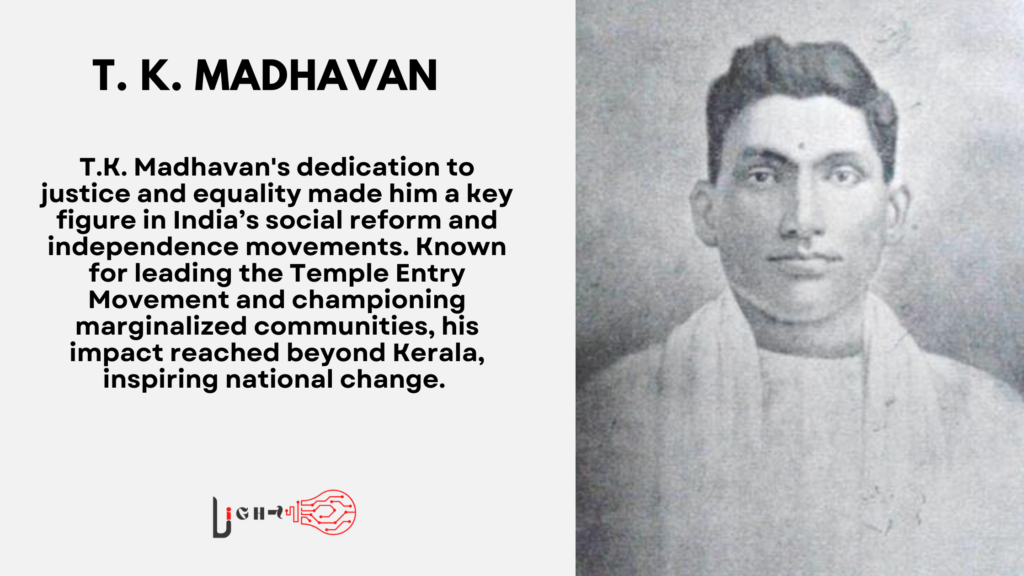T. K. Madhavan’s contributions to social reform and the independence movement in India stand as a testament to his unwavering commitment to justice and equality. Known for spearheading the Temple Entry Movement and advocating for the marginalized, Madhavan’s influence spread beyond Kerala, inspiring change at the national level. This blog uncovers his life, impact, and the legacy he left for future generations, celebrating the profound role he played in shaping modern India.
Early Life of T. K. Madhavan
T. K. Madhavan was born in 1885 in Kerala, into a society deeply rooted in rigid caste structures. From an early age, he exhibited a strong sense of justice and empathy, which eventually shaped his life’s path. His early encounters with discrimination sowed the seeds for his later pursuits in social justice.
Influenced by his family’s values and education, Madhavan grew up with a vision of a society where all people, regardless of caste or creed, could stand together. He believed that knowledge could be a powerful tool for change, leading him to explore paths of learning that expanded his worldview. His early experiences laid the foundation for his journey into the Indian freedom struggle and social reform.
Background and Education
T. K. Madhavan received his formal education in Kerala, a region known for its cultural heritage and educational pursuits. Growing up in an environment where traditional beliefs held sway, Madhavan sought to understand both the positive and oppressive aspects of his culture. His education equipped him with critical thinking skills and fueled his desire for social change. This foundation enabled him to recognize the deeply ingrained inequalities in society, setting the stage for his lifelong commitment to reform.
Contributions to Social Reform in Kerala
Madhavan’s life was defined by his contributions to social reform, especially in Kerala, where he took up the cause of the marginalized. His deep sense of justice led him to challenge established norms that restricted access to public spaces based on caste. He addressed these issues in multiple ways, working to uplift those oppressed by social structures. His advocacy wasn’t limited to rhetoric; he engaged actively with communities, understanding their struggles and amplifying their voices.
International Astronomical Union: Shaping the Future of Astronomy
To know more click here:https://light.vintbit.com/general-knowledge/international-astronomical-union/
Madhavan’s bold stance made him a pivotal figure in Kerala’s social reform movement. His actions were guided by a belief that all people deserve equal rights, regardless of social status. His determination to abolish oppressive practices laid a strong foundation for future movements within the region.
Role in the Temple Entry Movement
One of T. K. Madhavan’s most notable contribution was his role in the Temple Entry Movement, a historic initiative aimed at allowing lower-caste individuals entry into temples. Madhavan worked tirelessly to bring awareness to this cause, advocating for the rights of all people to worship freely. His efforts brought national attention to the plight of those denied entry to places of worship, sparking widespread discussions on equality. This movement not only marked a turning point for Kerala but also contributed to broader efforts for social justice across India.
Advocacy for the Rights of the Oppressed
Beyond the Temple Entry Movement, Madhavan championed the rights of Kerala’s oppressed communities in other ways as well. He openly criticized practices that maintained social hierarchies, using his voice to call for legislative changes. His advocacy paved the way for policies that promoted inclusivity, setting an example for other reformers. Madhavan’s work remains a cornerstone in the fight for social justice, embodying a legacy of resilience and resistance to injustice.
T. K. Madhavan’s Influence in India’s Freedom Movement
Madhavan’s activism extended beyond social reform; he was also a prominent figure in India’s freedom movement. His approach combined calls for independence with demands for social equality, ensuring that freedom from British rule would also mean freedom from oppressive social practices. He saw India’s independence as a chance to redefine social relations and advance equality for all citizens, advocating for a nation built on mutual respect and fairness.
Impact on Future Generations
The legacy of T. K. Madhavan’s work resonates in contemporary India, where his principles continue to inspire social activists and reformers. His dedication to equality and justice laid the groundwork for future movements aimed at dismantling caste-based discrimination. Madhavan’s influence is a reminder of the power of resilience and determination, urging today’s generation to continue the fight for a just society.
Legacy of T. K. Madhavan
T. K. Madhavan’s contributions have left an indelible mark on Indian society, particularly within Kerala, where his work is celebrated as a cornerstone of social progress. His efforts in the Temple Entry Movement remain a symbol of the quest for equality, and his advocacy has inspired numerous initiatives dedicated to social reform. The values he championed still guide the ongoing struggle for justice and inclusivity.
Continuing Social Influence
Today, T. K. Madhavan’s legacy lives on in the efforts of social reformers across India. His courage in challenging societal norms has become a benchmark for movements addressing inequality, reminding the nation of the importance of continuous advocacy for justice. Through education, awareness, and activism, Madhavan’s influence persists, encouraging future generations to uphold his vision of a fair and equal society.

